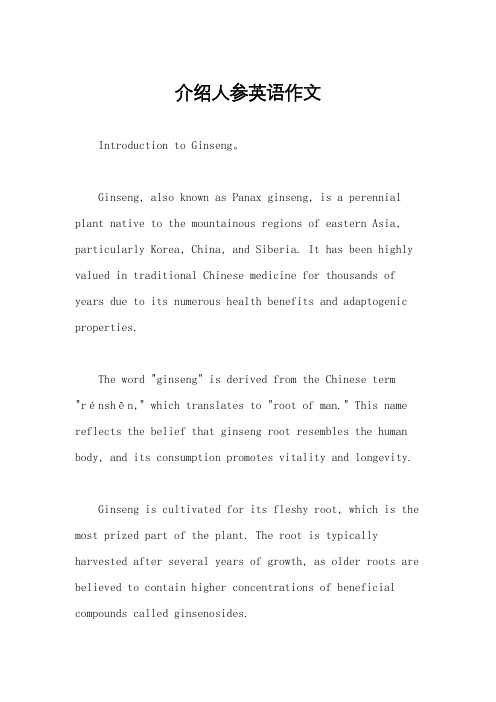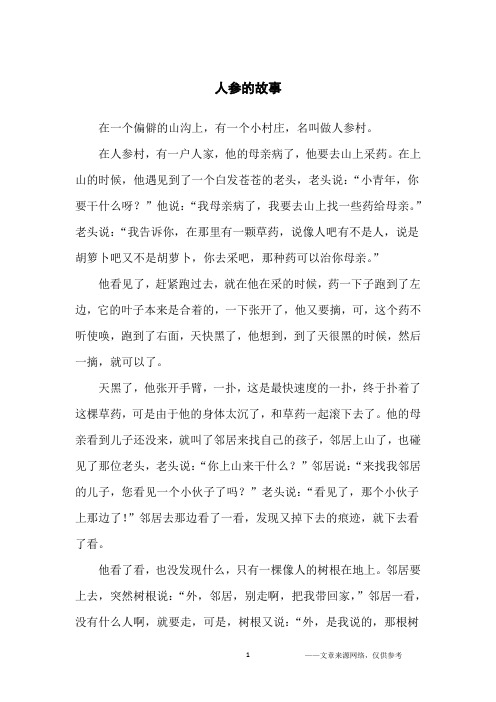人参的故事(英语故事)
- 格式:ppt
- 大小:938.50 KB
- 文档页数:14

用英文介绍中药名人小故事Title: Traditional Chinese Medicine: Anecdotes of Notable Figures Introduction:Traditional Chinese Medicine (TCM) has a rich history and is deeply rooted in Chinese culture.Over the centuries, many notable figures have contributed to the development and popularization of TCM.This article presents a collection of interesting anecdotes about some of these influential personalities.1.Huatuo: The Father of TCMHuatuo (190-208 AD) is widely regarded as the father of TCM.He was a brilliant physician and surgeon, known for his mastery of both herbal medicine and surgical techniques.One of the most famous anecdotes about Huatuo involves his encounter with a patient suffering from abdominal pain.After examining the patient, Huatuo diagnosed the problem as a intestinal obstruction.He decided to perform surgery to remove the obstruction, which was a revolutionary idea at that time.The surgery was successful, and the patient made a full recovery, earning Huatuo a place in the annals of TCM history.2.Li Shizhen: Compiler of the "Compendium of Materia Medica"Li Shizhen (1518-1593) was a renowned physician, herbalist, and pharmacologist.His most significant contribution to TCM is thecompilation of the "Compendium of Materia Medica," a massive encyclopedia that documents over 1,800 medicinal substances.An interesting anecdote about Li Shizhen involves his encounter with a patient suffering from epilepsy.When conventional treatments failed, Li Shizhen decided to experiment with an unusual herbal remedy.He prescribed the patient a tea made from the leaves of the ginkgo tree, which successfully cured the patient"s condition.This story highlights Li Shizhen"s willingness to explore unconventional treatments and his dedication to finding effective solutions for his patients.3.Bian Que: The Legendary HealerBian Que was an ancient Chinese physician who lived during the Spring and Autumn period (770-476 BC).He was known for his extraordinary diagnostic skills and his ability to predict diseases before they manifested symptoms.One famous anecdote about Bian Que tells of a nobleman who sought his advice regarding his wife"s pregnancy.Bian Que examined the woman and predicted that she would give birth to a healthy baby boy.However, he also warned that the child would suffer from a life-threatening disease at the age of 13.True to his prediction, the child fell ill at the specified age.Bian Que was called upon again and managed to cure the boy, demonstrating his remarkable medical skills and his ability to foresee health issues.4.Sun Simiao: The Saint of MedicineSun Simiao (581-682) was a famous physician and Daoist monk, known for his mastery of both TCM and spiritual healing.He is often referred to as the "Saint of Medicine." One inspiring anecdote about Sun Simiao involves his encounter with a wealthy nobleman who sought his help for a mysterious illness.After examining the patient, Sun Simiao diagnosed the condition as a result of the nobleman"s extravagant lifestyle and advised him to adopt a simpler, more spiritual way of life.The nobleman followed Sun Simiao"s advice and eventually recovered from his illness.This story reflects Sun Simiao"s belief in the importance of balance and harmony in both physical and mental health.Conclusion:These anecdotes of notable figures in TCM history provide a glimpse into the rich and fascinating legacy of Traditional Chinese Medicine.Their contributions have shaped the practice of TCM and continue to inspire practitioners and enthusiasts worldwide.。

人参的传说故事(一)人参的传说神奇的起源•人参,是一种生长在东亚地区的植物。
•早在古代,人参就被人们发现了其独特的药用价值。
•人参的传说可以追溯到几千年前。
天然的疗效•人参被誉为”多宝草”,因其具有多种药用功效而闻名。
•人参可以调理气血、益精气、强身健体。
•人参还可以缓解压力、增强记忆力、提高免疫力。
传说中的仙草•在古代,人们将人参视为仙草,认为它具有神奇的疗效。
•一些古代文献中记载了人参对长寿的帮助。
•人参在古代被视为延年益寿的圣草。
帝王与人参的故事•中国古代的皇帝常常以人参来延年益寿。
•人参被认为是帝王的专用药材。
•人参也被用来炼丹,寻求长生不老。
传承的医药文化•人参作为一种传统药用植物,积淀了丰富的医药文化。
•人参的种植、采摘、炮制都有一套独特的工艺和传统。
•人参也是中药学研究的重要组成部分。
人参的现代应用•如今,人参已广泛用于中药、保健品、化妆品等领域。
•人参被提取成粉末、浸膏、浓缩剂等多种形态。
•人参也出口到世界各国,为人们带去健康和美容的福祉。
神秘而珍贵•人参虽然被广泛利用,但因其生长环境、种植技术等因素限制,仍然属于稀有植物。
•人参价格昂贵,珍贵度如同它的传说一样。
人参的传说自古以来就一直流传在东亚地区,它作为一种药用植物拥有广泛的应用价值。
因其被誉为延年益寿的圣草,人参一直是帝王贵族追求的对象。
然而,人参不仅仅是一个具备传奇色彩的药用植物,更是承载着千百年来人们的医药文化和对健康长寿的向往。
如今,随着现代科技的发展,人参的应用领域也得到了扩展,为人们的健康和美容提供了更多选择。
虽然人参价格昂贵,但它的独特药用价值和神秘的传说使其深受人们的喜爱和追捧。
神奇的人参传说•人参传说自古以来就在东亚流传。
•人们相信人参具有神奇的疗效和延年益寿的能力。
•人参在传说中常常与仙人、神仙有关联。
人参与神仙的故事•根据传说,人参曾经被视为仙人的食物。
•传说中的神仙食用人参后,常常得到长寿的奇迹。
•人们将人参与长寿结合起来,认为它是长寿神奇的象征。

人参的传说故事人们常说东北有三宝人参、貂皮、乌拉草。
人参是三宝之首,能补气血、生津液,是一种名贵的中药材。
那你知道人参的传说故事有哪些吗?下面是店铺给大家分享的人参的传说故事,欢迎大家阅读。
人参的传说故事:人参娃娃很久以前,长白山里的一片山坡上,住着一个人参姑娘和她的一群弟弟。
这里山青水秀,草木繁茂,人参姑娘和弟弟们过着无忧无虑的生活。
这年春天,冰雪消融,有一伙挖参人来到这里,搭起窝棚住下,准备在这片山坡上寻找人参可是他们一连干了几天,连一片人参叶子都没见到,大伙儿都有点泄气。
领头的老汉外号“山里通”,他对大伙儿说这里山青水秀,草木放光,一定有大人参,让大家别泄气,大伙儿又安下心来在这片山坡上仔细搜寻。
这几天,人参姑娘带着弟弟们东躲西丨藏,担惊受怕。
这天夜里,人参姑娘和弟弟们商量,让弟弟们都搬到别的山坡去住,自己在这儿看家,等挖参人走了后再去接他们回家。
弟弟们怕姐姐被挖参人抓住,便要求姐姐和大家一起走。
人参姑嫁说自己一天能跑九个山头,挖参人捉不住,让弟弟们放心,他们正商量着,这时,挖参人中有个青年人名叫进宝,出来解溲。
他听到山坡上有人说话,心想半夜里还有谁在山坡上呢?他悄悄走到附近,一看是个大姑娘和几个小男孩在商量事情。
他一不留神,脚下踩着的枯树枝发出“哗啦”一声响,忽然,姑娘和小男孩都不见了。
进宝回到窝棚,把刚才看到的情景对山里通说了。
山里通心里明白这是遇到人参姑娘了。
他仔细问明地点,第二天一早就让进宝带着大伙儿直奔那里而去。
大家找了半天什么都没发现。
这时,突然听到山里通大叫一声“棒槌”(长白山里人对人参的一种叫法),大伙儿到跟前一看,什么都没有。
山里通告诉大伙,刚才找到一棵人参,顶着两个红亮红亮的参籽,一喊就不见了。
这就是一天能跑九个山头的人参姑娘。
大家一听来了劲,忙让山里通带着去追人参姑娘。
山里通带着人一连追了八个山头,每个山头都有人看见过那个人参姑娘,但哪个山头也是一喊就不见了。
只有进宝没有看见。

关于人参的故事在中国古代,人参被视为一种神秘的草药,被广泛认为具有补气养血、安神益智等多种功效。
关于人参的故事有很多,以下是其中几个。
故事一:古代王室与人参在中国古代,人参被视为一种珍贵的草药,常常被用于治疗各种疾病。
据传说,很久以前,有一个皇帝得了重病,御医们使用了各种药物都没有治好他的病。
有一天,一个道士向皇帝推荐了一种神秘的草药——人参。
皇帝服用后,病果然好了许多。
从此以后,人参便成为了中国古代王室贵族们的珍贵药材。
故事二:寻找人参的女孩在古代中国的一个小村庄里,住着一个叫小芳的女孩。
她的父亲是一个勤劳的农民,但是他们家非常贫困。
小芳听说人参可以卖很多钱,于是决定去寻找人参。
她在山上寻找了很久,终于发现了一棵人参。
正当她准备挖人参的时候,一位老神仙出现了,告诉她:“这棵人参不是普通的草药,它有神奇的力量,可以帮助你实现一个愿望。
”小芳想了想,便许愿希望自己和家人能够过上幸福的生活。
她回到家里,将人参卖了好多钱,实现了自己的愿望。
故事三:人参的神奇力量在中国的一个小村庄里,有一个叫阿明的年轻人。
他非常懒惰,整天游手好闲。
有一天,他听说了一个关于人参的传说——只要找到一根真正的人参,就能拥有神奇的力量。
阿明决定去山上寻找人参。
经过长时间的寻找,他终于发现了一根真正的人参。
他高兴地拿着人参回到了村子里。
村子里的人都很羡慕他找到了这么好的草药。
阿明把人参放在家里,每天都精心照顾它。
有一天晚上,他做了一个奇怪的梦。
在梦中,他看到了一个神仙,神仙告诉他:“你找到的人参可以帮助你实现一个愿望。
”阿明想了想,便许愿希望自己能够成为一个勤劳、善良、有出息的人。
自从那个梦后,阿明完全变了样,他开始努力工作、学习,并且帮助村子里的人们做好事。
村子里的人们都称赞他是一个好人。
以上就是关于人参的几个故事。
在中国文化中,人参被赋予了很多神秘的色彩,被认为是神奇的草药。
但是实际上,人参只是一种植物,它具有补气养血、安神益智等多种功效。

介绍人参英语作文Introduction to Ginseng。
Ginseng, also known as Panax ginseng, is a perennial plant native to the mountainous regions of eastern Asia, particularly Korea, China, and Siberia. It has been highly valued in traditional Chinese medicine for thousands of years due to its numerous health benefits and adaptogenic properties.The word "ginseng" is derived from the Chinese term"rénshēn," which translates to "root of man." This name reflects the belief that ginseng root resembles the human body, and its consumption promotes vitality and longevity.Ginseng is cultivated for its fleshy root, which is the most prized part of the plant. The root is typically harvested after several years of growth, as older roots are believed to contain higher concentrations of beneficial compounds called ginsenosides.In traditional medicine, ginseng is revered for its ability to boost energy, improve cognitive function, and enhance overall well-being. It is often used as an adaptogen, helping the body to better cope with physical and mental stress. Additionally, ginseng is believed to support immune function, promote cardiovascular health, and regulate blood sugar levels.Modern scientific research has provided furtherinsights into the potential health benefits of ginseng. Studies have shown that ginsenosides, the active compounds in ginseng, possess antioxidant and anti-inflammatory properties, which may help protect cells from damage and reduce the risk of chronic diseases.Furthermore, ginseng has been investigated for its potential role in enhancing athletic performance, reducing fatigue, and improving sexual function. While more research is needed to fully understand the mechanisms behind these effects, ginseng remains a popular natural remedy for promoting vitality and overall health.Ginseng is available in various forms, including fresh roots, dried roots, powders, extracts, and supplements. It can be consumed orally as a tea, capsule, or tincture, or applied topically in creams and ointments.However, it's essential to use ginseng responsibly and consult with a healthcare professional before adding it to your routine, especially if you have underlying health conditions or are taking medications. Like any herbal supplement, ginseng may interact with certain drugs or have adverse effects in some individuals.In conclusion, ginseng is a remarkable plant with a long history of use in traditional medicine and a growing body of scientific evidence supporting its health benefits. Whether you're looking to boost your energy levels, support your immune system, or improve your overall well-being, ginseng may offer a natural solution worth exploring.。

人参的故事
在一个偏僻的山沟上,有一个小村庄,名叫做人参村。
在人参村,有一户人家,他的母亲病了,他要去山上采药。
在上山的时候,他遇见到了一个白发苍苍的老头,老头说:“小青年,你要干什么呀?”他说:“我母亲病了,我要去山上找一些药给母亲。
”老头说:“我告诉你,在那里有一颗草药,说像人吧有不是人,说是胡箩卜吧又不是胡萝卜,你去采吧,那种药可以治你母亲。
”
他看见了,赶紧跑过去,就在他在采的时候,药一下子跑到了左边,它的叶子本来是合着的,一下张开了,他又要摘,可,这个药不听使唤,跑到了右面,天快黑了,他想到,到了天很黑的时候,然后一摘,就可以了。
天黑了,他张开手臂,一扑,这是最快速度的一扑,终于扑着了这棵草药,可是由于他的身体太沉了,和草药一起滚下去了。
他的母亲看到儿子还没来,就叫了邻居来找自己的孩子,邻居上山了,也碰见了那位老头,老头说:“你上山来干什么?”邻居说:“来找我邻居的儿子,您看见一个小伙子了吗?”老头说:“看见了,那个小伙子上那边了!”邻居去那边看了一看,发现又掉下去的痕迹,就下去看了看。
他看了看,也没发现什么,只有一棵像人的树根在地上。
邻居要上去,突然树根说:“外,邻居,别走啊,把我带回家,”邻居一看,没有什么人啊,就要走,可是,树根又说:“外,是我说的,那根树
根,快,把我找一个深坑种起来。
如果结了小枝子,就把他们拿下来”听了这句话,邻居带走了树根回家种在一个深坑,不久,就结了小枝子,邻居采了几枝给他的母亲喝了,他的母亲马上好了,很多人知道了就来这里要。
这个小伙子,真是舍己为人啊,我们都要学他这种精神!
进修五年级:李浩然。
传说中的神奇灵草人参的故事在中国的传说中,有一种被誉为“神奇灵草”的植物,它就是人参。
人参被认为是天地间的灵气所化,具有神奇的疗效和修身养性的功效。
它被视为珍贵药材和重要养生品,许多人都争相追求它的好处。
人参的故事可以追溯到古代。
相传,上古时期,人类刚刚出现在地球上,生活条件艰苦,没有足够的食物和药物来维持生命。
于是,天地间的神祇们决定创造一种灵草来帮助人们。
神祇们汇聚了天地间的灵气和神秘力量,用它们的力量创造了人参。
人参的形状就像人的身体,长有红色的根茎和翠绿的叶子,被誉为“万草之王”。
人参拥有神奇的功效,每一片叶子都散发着宜人的香气,草丛中长满了润泽的人参根茎。
它所散发的香气可以改善人们的身心状态,促进睡眠,提高记忆力。
人们发现,服用人参可以治疗许多疾病,延缓衰老,增加体力和耐力。
自古以来,人参就被视为珍贵的药材,只有帝王贵族和高僧大德才能享用。
他们将人参奉献给神祇,祈求健康和长寿。
传说中,人参还可以使人们的精神焕发,增强智慧和领悟力。
所以,修行者和文人墨客常常以人参来提高自己的才华和艺术表现力。
然而,由于人参产量稀少,采集人参也非常困难,导致人参价格居高不下。
人们开始寻找其他植物来替代人参,但无论如何都无法比拟其神奇的疗效和养生功效。
历经千年,人参终于被传入民间。
普通人开始认识到人参的价值,并将其用于保健和疾病治疗。
人们将人参炖汤、制成膏剂或烹饪成美味的佳肴,如人参鸡汤、红烧人参肉等,以期获得其独特的药效和滋补功效。
如今,在市场上可以找到多种形式的人参产品,包括人参粉、人参胶囊和人参片等。
然而,人们也要警惕市场上的假冒伪劣产品,因为许多商家为了迎合需求,使用劣质的原料制作人参产品,对人体健康产生负面影响。
传说中的神奇灵草人参在现代人的生活中扮演着重要的角色。
它被广泛应用于医疗、保健和美容行业。
许多人将人参视为身体健康和长寿的秘密武器,他们相信,只有拥有健康的身体和精神,才能真正享受生活的美好。
人参成精的故事(原创实用版3篇)篇1 目录1.人参的传说与历史2.人参成精的故事概述3.故事的具体情节4.故事的寓意与启示篇1正文人参成精的故事,是人类对于人参这一神秘植物的想象与传说。
人参,被誉为“国宝”,有着悠久的历史和丰富的文化内涵。
自古以来,人们就相信人参具有神奇的药用价值和神秘的力量,甚至认为人参可以成精。
下面我们就来详细讲述一个人参成精的故事。
从前,在一个偏远的山村里,有一位叫阿宝的青年。
阿宝以采药为生,每天都在大山里寻找各种药材。
有一天,阿宝在深山老林里发现了一棵非常特别的人参。
这棵人参长得又大又肥,通体金黄,散发着诱人的香气。
阿宝惊喜万分,立刻将它挖了出来。
然而,当阿宝将人参拿回家时,却发生了一件奇异的事情。
晚上,当阿宝准备入睡时,他发现那棵人参竟然变成了一个美丽的少女。
阿宝惊呆了,不知道这是怎么回事。
少女对他说:“阿宝,我是一棵成精的人参,感谢你救了我的命,现在我要报答你。
”说完,少女给阿宝传授了一些医药知识,帮助他成为了一名优秀的医生。
自从那以后,阿宝医术高明,声名远扬,成了山村里的名医。
人们都对他感激不已,他也过上了幸福的生活。
这个故事告诉我们,善良的行为会带来好的回报,我们要善待万物,才能获得美好的人生。
人参成精的故事,虽然只是一种传说,但它却反映了我国古代劳动人民对自然界的敬畏与感恩。
篇2 目录1.人参的传说和象征意义2.人参成精的故事起源和发展3.人参成精故事的代表作品和特点4.人参成精故事的寓意和价值5.人参成精故事在现代社会的影响和传承篇2正文人参成精的故事是中国古代传说和民间故事中一个非常特别的题材。
人参,被誉为“草木之中的精灵”,自古以来就被视为吉祥、祥瑞的象征。
同时,人参还具有神秘的药用价值,被认为能延年益寿、起死回生。
正是由于人参的神奇特性,使得人参成精的故事在民间广为流传。
人参成精的故事起源很早,早在先秦时期的古籍中就有关于人参的传说。
随着时间的推移,这个题材不断发展,故事内容越来越丰富。
人参功效英文作文Ginseng is a popular herb known for its various health benefits. It is believed to boost energy levels and improve mental clarity. Many people consume ginseng as a natural remedy for fatigue and stress. It is also considered to be an immune system booster, helping to prevent illnesses and infections. Additionally, ginseng is believed to have anti-inflammatory properties, which can aid in reducing inflammation and promoting overall well-being.Not only is ginseng known for its physical benefits, but it is also believed to have positive effects on cognitive function. Many people claim that ginseng can enhance memory and improve concentration. It is often used as a natural supplement by students and professionals who want to improve their focus and productivity. Some studies have even suggested that ginseng may have potentialbenefits for individuals with neurodegenerative diseases, such as Alzheimer's.Furthermore, ginseng is often used as an aphrodisiac due to its potential to enhance sexual performance. It is believed to increase libido and improve erectile dysfunction in men. Many people view ginseng as a natural alternative to pharmaceutical drugs for sexual health. However, it is important to note that more research is needed to fully understand the effects of ginseng on sexual function.In addition to its physical and cognitive benefits, ginseng is also believed to have mood-enhancing properties. Some people claim that consuming ginseng can help alleviate symptoms of depression and anxiety. It is thought to have a calming effect on the mind and promote a sense of well-being. However, it is important to consult with a healthcare professional before using ginseng as a treatment for mental health conditions.Overall, ginseng is a versatile herb that is believed to have numerous health benefits. From boosting energy levels to improving cognitive function and enhancing sexual performance, ginseng is a popular natural remedy. However,it is important to remember that individual results may vary, and it is always best to consult with a healthcare professional before incorporating ginseng into your daily routine.。
用英文介绍中药药材作文Title: Introduction to Traditional Chinese Medicinal Herbs。
Traditional Chinese medicinal herbs have been an integral part of Chinese culture and healthcare for thousands of years. These herbs, derived from various plants, animals, and minerals, are used in traditional Chinese medicine (TCM) to prevent and treat a wide range of ailments. In this article, we will explore some commonly used Chinese medicinal herbs and their therapeutic properties.1. Ginseng (人参)。
Ginseng, known as "Ren Shen" in Chinese, is one of the most well-known and widely used medicinal herbs in TCM. It is revered for its adaptogenic properties, which help the body adapt to stress and promote overall wellbeing. Ginseng is believed to enhance energy, improve cognitive function,and strengthen the immune system. It is commonly used to treat fatigue, boost vitality, and promote longevity.2. Ginkgo Biloba (银杏)。